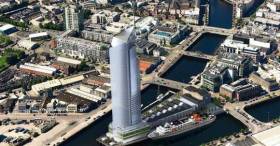Displaying items by tag: Historic Warehouses
Petition to Lord Mayor to Protect Historic Buildings at Port of Cork Site
#WaterfrontProperty - Calls for the protection of historic buildings at the Port of Cork that secured in a petition more than 1,500 signatures has been presented to the Lord Mayor of Cork city.
The Port of Cork site reports the Evening Echo was purchased by New York-based Irish developers, Kevin and Donal O’Sullivan, who have plans for a €100m development, including a 40-storey skyscraper.
For further reading, click here.





























































